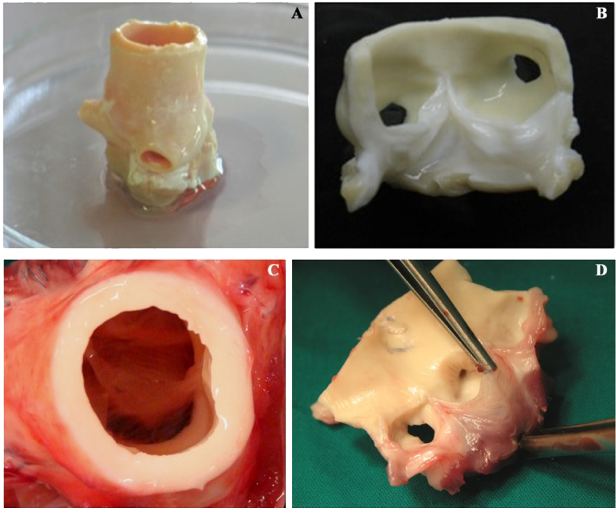Cardiovascular Sciences
Research
The CMBM Group of Cardiovascular Sciences, directed by Prof. Gerosa, aims at developing increasingly efficient treatments for cardiovascular diseases, the main cause of mortality worldwide. The key research topics are heart failure to be treated with ventricular assistance devices and total artificial hearts. Furthermore, great importance is given to find new therapeutic solutions for valve insufficiency. In this regard, new valve repair techniques have been devised for mitral valve insufficiency and the most modern technologies for the treatment of aortic valve insufficiency are adopted, also in a minimally invasive way. The group is also involved in developing new bioengineered valve substitutes in the laboratory, starting from decellularized tissues, with superior performance and biocompatibility properties (Figure 1) compared to those shown by current commercialized biological and mechanical prostheses.

Macroscopic appearance of a decellularized allogeneic aortic valve before and after implantation in a porcine validation model. Allogeneic substitutes showed similar gross morpho-anatomic structure to native valves without signs of leaflet fenestration, rupture or degeneration both after decellularization (A-B) and explant at 15 months of in vivo follow up (C-D). From Iop et al, Plos One 2014;9:e99593.
Educational Program
Educational and training activities are oriented to create highly qualified experimental and clinicalresearchers throughout Specialty, Master and Doctoral Courses (Department of Cardiac, Thoracic and Vascular Sciences). The Specialty School in Cardiac Surgery and the Master in ‘Application of new technologies in the surgical therapies of heart diseases’ represent important educational appointments for further specialization of medical doctors, while the Doctoral Course in Cardiovascular Sciences is also opened to non-MD graduates.
Equipment
The Facilities of the Cardiovascular Regenerative Medicine Unit are equipped for animal tissue processing, decellularization, biochemistry, cell culture, histology and immunohistochemistry, light and fluorescent microscopies, spectrophotometry, molecular biology and biomechanical testing.